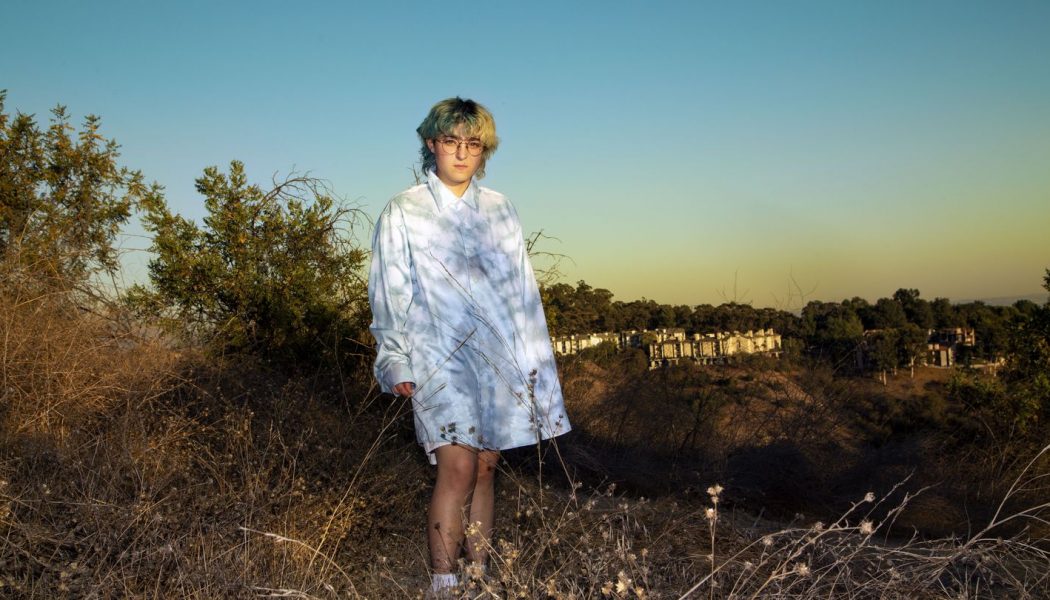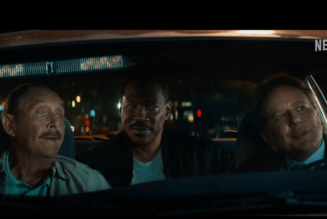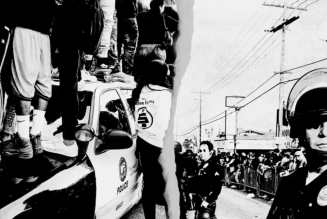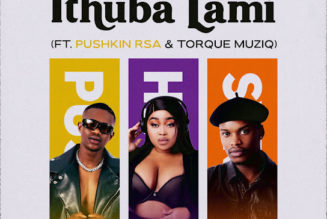
When COVID-19 production shutdowns forced many musicians to record alone for the first time, indie-pop ingenue Claud Mintz had a leg up. They began writing and releasing music in 2018 as the lead of Toast, a now-defunct lo-fi duo they formed as a college student with their best friend, producer Josh Mehling. Although they lived in the same city and attended university together, the pair recorded separately by sending instrumental tracks or half-baked song ideas back and forth. “We’ve never been able to make music in the same room,” Claud, who performs mononymously, tells MTV News over Zoom while hunkered down in Los Angeles. “If we are in the same room, we get distracted or we get embarrassed, and we just can’t do it. So it didn’t feel unusual because that’s what I’ve been doing this whole time.”
Under a mop of cotton candy-colored curls, Claud is humble and soft-spoken, but don’t let that fool you into thinking they don’t know what they’re talking about. At 21, Claud has already released the eight-track EP Sideline Star, collaborated with their bedroom-pop contemporary Clairo, and caught the attention of Grammy-nominated indie-rocker Phoebe Bridgers. Their full-length debut, Super Monster, drops Friday (February 12) via Saddest Factory, Bridgers’s fledgling record label. To date, Claud is Saddest Factory’s only signee. “I was in conversation with a few other labels,” they remember. “But I sort of felt like, if I was going to sign and to really trust the team that I was going to sign to, I’d want it to be somebody who understands my perspective and an artist that I could really trust creatively.” Bridgers, an industry-savvy powerhouse with “her finger on the pulse,” fit the bill.
Toast is no longer together, but Claud is still BFFs with Mehling, who played on and co-produced several songs from Super Monster, including the winking single “Cuff Your Jeans” and the self-reflective finale “Falling With the Rain.” The album also features contributions from production duo Zach & Roger and Dan Nigro, who was behind Olivia Rodrigo’s runaway hit single “Drivers License.” Mehling and Claud’s decision to retire Toast was entirely amicable: After their earliest releases gained some traction, the psychedelic rock band The Marias and alternative trio Triathlon approached Claud and Mehling about joining their tour. Mehling passed in favor of staying in school, but Claud agreed. “[Josh] was like, ‘Just go for a few months,’” they recall. “And then a few months turned into a few years.”
Toward the tail end of the Toast era, Bridgers found Claud’s music and “really liked it,” they remember. “We started having meetings, and she’d come to my shows.” Wow, remember shows? Claud does, fondly. In fact, promoting their new record during the pandemic means they will miss out on one of their favorite live-music moments: singing their sometimes “very jarring lyrics” to an unsuspecting audience. They cite “Wish You Were Gay” (the genuinely queer Claud cut, not the petty Billie Eilish song) as a prime example. “Seeing people’s reactions was just so fun.”
Claud’s songwriting style is autobiographical, and they have been open about being queer and nonbinary throughout their career. Coming out, as we understand it in the traditional sense, was never a calculated decision. “I think whether I was out or not, I’d still be writing about gay shit because I am gay,” they explain with a shrug.
Indeed, “gay shit” is everywhere on Super Monster. The record is a hodgepodge of songs written and recorded before and during the pandemic, but Claud’s bright sound and contemplative songwriting are present throughout. It features two tracks named after old flames: “Ana,” a wistful letter to an ex after a mutual breakup, and “Jordan,” an angstier cut about an unhealthy relationship. “Bet you didn’t know I won’t let a straight man throw me off,” Claud insists in the pre-chorus of the playfully defiant “That’s Mr. Bitch to You.”
Even the album’s title — a reference to a sketch by late visual artist and musician Daniel Johnston called “Claud the Super Monster” — can be interpreted as a metaphor for exploring gender beyond the binary. Claud isn’t a superhero or a monster; they’re a “super monster,” defying the rigid labels and tired archetypes we’ve all been conditioned to uphold. “It’s all a metaphor,” Claud says with a knowing laugh.
But openness isn’t without its drawbacks. Claud points out that, in most press coverage, their identity is mentioned before their name. “It was something I noticed this summer,” they say. “Every article about me [was titled] ‘queer artist Claud’ or ‘nonbinary artist Claud.’” Of course, being able to have a career as an out recording artist is a good thing, as well as a relatively new phenomenon. But this “label-y” mindset, as Claud calls it, can feel tokenizing to marginalized artists and distract from their work. For Claud, whose songs tell deeply personal stories of yearning and heartbreak, who they are can be heard in the music. “Cuff Your Jeans,” a memorable cut off Super Monster, is so sonically lush that it’s easy to miss the self-aware reference to that enduring joke about how some style their denim.
Claud, ever wise beyond their years, proposes a simple solution to this complicated dilemma. “If you want to highlight [queer] artists, just do it,” they say. “You don’t have to say you’re doing it.”






![Burna Boy – Wonderful [Lyrics]](https://www.wazupnaija.com/wp-content/uploads/2020/06/burna-boy-wonderful-lyrics-327x219.jpg)




